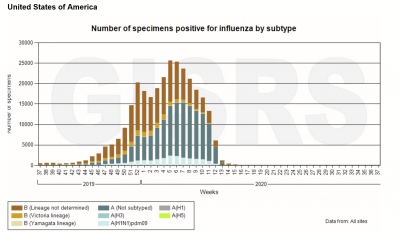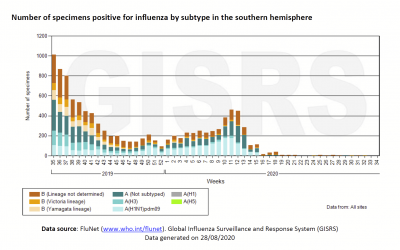
The continued practice of physical distancing and mask-wearing in Massachusetts has generated a benefit second to slowing coronavirus spread: fewer people are contracting other illnesses.
Gov. Charlie Baker said in a press conference Wednesday that residents’ high compliance with public health protocols is responsible for the trend.
“Because people are doing such a good job in Massachusetts for the most part around wearing masks and distancing,” Baker said, “ear infections, sore throats, strep throats, traditional respiratory infections, a whole bunch of things, separate and apart from [COVID-19], are just way down.”
Data on Massachusetts’s infectious disease cases and transmission has yet to be released. Shira Doron, hospital epidemiologist at Tufts Medical Center, said last year’s flu season ended as soon as the COVID-19 lockdown began.
“We tracked hospitals’ influenza-positive tests on a weekly basis. And what we saw is that here in the hospital, as soon as the stay at home order was issued, it was stopped abruptly,” Doron said. “Immediately, flu was gone.”

Diminished positivity rates for flu and other illnesses were not caused by sick patients avoiding doctors’ offices, Doron said. Hospitals like Tufts Medical Center tested patients with COVID-19 symptoms for the flu before testing for the coronavirus due to limited COVID-19 test availability.
“It’s not that we weren’t looking,” Doron said. “There literally just was no flu.”
Other countries recorded similar flu transmission trends. South Africa, which recently emerged from its flu season, has reported only one flu case, Doron said.
There has been such little flu activity within the Southern Hemisphere’s usual peak season that the World Health Organization’s August Influenza Report stated the influenza season “has not started” in this region, despite some countries having “continued or even increased testing for influenza.”

COVID-19 and other respiratory viruses are transmitted in similar ways, according to the National Center for Biotechnology Information. By reducing droplet transmission, close contact with hosts and the touching of surfaces, Doron said individuals have slowed the spread of COVID-19 as well as other illnesses.
“I think a lot of people have commented anecdotally, ‘Wow, it’s been a really long time since I’ve been sick,’” Doron said.
With fewer trips to emergency rooms and doctors’ offices, Baker said during the conference that the state has saved money.
“Germs don’t have the ability, necessarily, to travel the way they have in years past,” Baker said. “As a result, health care expenses, which the Commonwealth has a ton of, are continually coming in below where we thought they would come in.”
Doron said as the weather gets cooler, the state may see an uptick in COVID-19 cases — as residents move indoors, it may be more difficult to adhere to social distancing guidelines.
“We’ve been able to do a lot of things outside, whether that’s dining, whether that’s gathering, whether that’s exercising,” Doron said. “When we can’t do that anymore just [because] we’re not going to be likely to give those things up again … we’re going to see some more transmission.”
Baker said there is still uncertainty about the pandemic’s course heading into the colder months.
“When you’re working through an unprecedented time that no one has ever worked through before, predictions and projections are predictions and projections,” Baker said, “which is why we’re doing a lot of scenario planning as opposed to trying to figure out exactly what we think is going to happen in the fall.”

























































































































